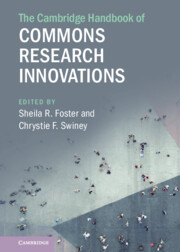Book contents
- The Cambridge Handbook of Commons Research Innovations
- The Cambridge Handbook of Commons Research Innovations
- Copyright page
- Contents
- Figures
- Tables
- Contributors
- Introduction
- Part I Revisiting the Origins and Evolution of Commons Thought
- Part II Averting New Tragedies
- Part III New Forms of Contested Commons
- 7 Reimagining Urban Public Housing as a Commons
- 8 Humanitarian Aid as a Shared and Contested Common Resource
- 9 The Economic System as a Commons
- Part IV Urban Landscape and Infrastructure as a Commons
- Part V Reassessing Old and New Institutions for Collective Action
- Part VI Managing and Restoring the Commons
- Part VII Law, Legal Theory, and the Commons
- Part VIII Technology, the Internet, and the Future of Commons Governance
- Index
9 - The Economic System as a Commons
An Exploration of Shared Institutions
from Part III - New Forms of Contested Commons
Published online by Cambridge University Press: 29 October 2021
- The Cambridge Handbook of Commons Research Innovations
- The Cambridge Handbook of Commons Research Innovations
- Copyright page
- Contents
- Figures
- Tables
- Contributors
- Introduction
- Part I Revisiting the Origins and Evolution of Commons Thought
- Part II Averting New Tragedies
- Part III New Forms of Contested Commons
- 7 Reimagining Urban Public Housing as a Commons
- 8 Humanitarian Aid as a Shared and Contested Common Resource
- 9 The Economic System as a Commons
- Part IV Urban Landscape and Infrastructure as a Commons
- Part V Reassessing Old and New Institutions for Collective Action
- Part VI Managing and Restoring the Commons
- Part VII Law, Legal Theory, and the Commons
- Part VIII Technology, the Internet, and the Future of Commons Governance
- Index
Summary
Elinor Ostrom pointed out significance of rule structures, and the need for institutional diversity in addressing commons problems.This is particularly true in relation to the governance of large-scale commons resources and one global commons that requires attention is the economic system.We share the institutional arrangements that generate economic benefits but neither the wealth generated by the system, nor the negative impacts, are shared equally.The result is an economic system focused on the privatisation of shared resources that generates inequalities around the globe. This paper explores the economic system as a ‘co-created’ commons.The paper brings together two broad strands of literature on commons: one arising from the public trust doctrine, and the other based on the economic characteristics of a good or service in terms of its access (‘excludability’) and consumption (‘subtractability’).The paper links these concepts with more recent work on ‘productive commons’, where shared resources are generated through collaborative activity, and ideas from evolutionary economics, which explore the economic system as a process and structure of rules, rather than as a series of transactions based on the allocation of property rights.Evidence is provided to support the argument that commons are an integral element of the economic system, and as a result account for some of its efficiencies and, where rule structures fail, for negative impacts on socio-economic and ecological systems.
Keywords
- Type
- Chapter
- Information
- The Cambridge Handbook of Commons Research Innovations , pp. 100 - 110Publisher: Cambridge University PressPrint publication year: 2021

